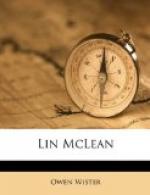“It ain’t only her he’s stopped caring for,” mused Lin, as he rode slowly along. “He don’t care for himself any more.”
PART III
To-day, Drybone has altogether returned to the dust. Even in that day its hour could have been heard beginning to sound, but its inhabitants were rather deaf. Gamblers, saloon-keepers, murderers, outlaws male and female, all were so busy with their cards, their lovers, and their bottles as to make the place seem young and vigorous; but it was second childhood which had set in.
Drybone had known a wholesome adventurous youth, where manly lives and deaths were plenty. It had been an army post. It had seen horse and foot, and heard the trumpet. Brave wives had kept house for their captains upon its bluffs. Winter and summer they had made the best of it. When the War Department ordered the captains to catch Indians, the wives bade them Godspeed. When the Interior Department ordered the captains to let the Indians go again, still they made the best of it. You must not waste Indians. Indians were a source of revenue to so many people in Washington and elsewhere. But the process of catching Indians, armed with weapons sold them by friends of the Interior Department, was not entirely harmless. Therefore there came to be graves in the Drybone graveyard. The pale weather-washed head-boards told all about it: “Sacred to the memory of Private So-and-So, killed on the Dry Cheyenne, May 6, 1875.” Or it would be, “Mrs. So-and-So, found scalped on Sage Creek.” But even the financiers at Washington could not wholly preserve the Indian in Drybone’s neighborhood. As the cattle by ten thousands came treading with the next step of civilization into this huge domain, the soldiers were taken away. Some of them went West to fight more Indians in Idaho, Oregon, or Arizona. The battles of the others being done, they went East in better coffins to sleep where their mothers or their comrades wanted them. Though wind and rain wrought changes upon the hill, the ready-made graves and boxes which these soldiers left behind proved heirlooms as serviceable in their way as were the tenements that the living had bequeathed to Drybone. Into these empty barracks came to dwell and do business every joy that made the cow-puncher’s holiday, and every hunted person who was baffling the sheriff. For the sheriff must stop outside the line of Drybone, as shall presently be made clear. The captain’s quarters were a saloon now; professional cards were going in the adjutant’s office night and day; and the commissary building made a good dance-hall and hotel. Instead of guard-mounting, you would see a horse-race on the parade-ground, and there was no provost-sergeant to gather up the broken bottles and old boots. Heaps of these choked the rusty fountain. In the tufts of yellow, ragged grass that dotted the place plentifully were lodged many aces and queens and ten-spots, which the Drybone wind had blown wide from the doors out of which they had been thrown when a new pack was called for inside. Among the grass tufts would lie visitors who had applied for beds too late at the dance-hall, frankly sleeping their whiskey off in the morning air.




